 It's rather ironic that a guy who refused to accept the technology ofemail (which predates Non recordings actually) has released an albummixed in 5.1 surround for compatible high fidelity DVD systems.(Unfortunately, months after owning this, I have yet to experience thehorror in full surround.) Following Non's brightest album, (theunofficial tribute to Phil Spector and girl groups, 'Receive theFlame'), Boyd Rice strays further away from Non's noise roots, yetreturns to a dark sound, roping in grand orchestral and choral samplesto the mix of fire and death. 'Children of the Black Sun' is Rice's alltoo brief aural tour of the underworld, where seven spots highlightvarious mythologies' takes on the darker side of the afterlife and whatkeeps the world cyclic. While the album is potentially rich withfascinating themes, I feel the music is rather undeveloped, far tooshort, and somewhat haphazardly tossed together. Opening with a briefvocal recording, the sound immediately morphs into a heavy drone. Harpsweeps, viola strikes and distant screams additionally color thesoundtrack of "Arka," the place where Cain was exiled to after hisexpulsion from Eden. Without pause, the tour continues on through"Black Sun," where a single note horn drones on in the foreground whilean orchestra holds painfully for resolution it never sees. The tensionworks but the development sounds far from complete. From here, the tourcontinues through five more locations, gliding from track to trackwithout stopping, each incorporating a new set of sounds. The distantmachinery-like noises of "Serpent of the Abyss" subside to fliespicking off tasty morsels on a rotting corpse on "The UndergroundStream," while the echoed choral loops carefully matched with cracklingfire and crashing waves on "The Fountain of Fortune" give way to thealbums closer, the 51-second "Son of the Sun," where a distortedbackwards speech clumsily accompanies an unexciting orchestral loop.(Spin it backwards for extra insult if you really find the need toshell out the cash for 31 minutes of average drone loops.) I could begravely mistaken on the value of this album, since I haven'texperienced the full spectrum, but musically, I'm going to make aneducated guess that the listening experience doesn't get a whole lotbetter.
It's rather ironic that a guy who refused to accept the technology ofemail (which predates Non recordings actually) has released an albummixed in 5.1 surround for compatible high fidelity DVD systems.(Unfortunately, months after owning this, I have yet to experience thehorror in full surround.) Following Non's brightest album, (theunofficial tribute to Phil Spector and girl groups, 'Receive theFlame'), Boyd Rice strays further away from Non's noise roots, yetreturns to a dark sound, roping in grand orchestral and choral samplesto the mix of fire and death. 'Children of the Black Sun' is Rice's alltoo brief aural tour of the underworld, where seven spots highlightvarious mythologies' takes on the darker side of the afterlife and whatkeeps the world cyclic. While the album is potentially rich withfascinating themes, I feel the music is rather undeveloped, far tooshort, and somewhat haphazardly tossed together. Opening with a briefvocal recording, the sound immediately morphs into a heavy drone. Harpsweeps, viola strikes and distant screams additionally color thesoundtrack of "Arka," the place where Cain was exiled to after hisexpulsion from Eden. Without pause, the tour continues on through"Black Sun," where a single note horn drones on in the foreground whilean orchestra holds painfully for resolution it never sees. The tensionworks but the development sounds far from complete. From here, the tourcontinues through five more locations, gliding from track to trackwithout stopping, each incorporating a new set of sounds. The distantmachinery-like noises of "Serpent of the Abyss" subside to fliespicking off tasty morsels on a rotting corpse on "The UndergroundStream," while the echoed choral loops carefully matched with cracklingfire and crashing waves on "The Fountain of Fortune" give way to thealbums closer, the 51-second "Son of the Sun," where a distortedbackwards speech clumsily accompanies an unexciting orchestral loop.(Spin it backwards for extra insult if you really find the need toshell out the cash for 31 minutes of average drone loops.) I could begravely mistaken on the value of this album, since I haven'texperienced the full spectrum, but musically, I'm going to make aneducated guess that the listening experience doesn't get a whole lotbetter.  It's rather ironic that a guy who refused to accept the technology ofemail (which predates Non recordings actually) has released an albummixed in 5.1 surround for compatible high fidelity DVD systems.(Unfortunately, months after owning this, I have yet to experience thehorror in full surround.) Following Non's brightest album, (theunofficial tribute to Phil Spector and girl groups, 'Receive theFlame'), Boyd Rice strays further away from Non's noise roots, yetreturns to a dark sound, roping in grand orchestral and choral samplesto the mix of fire and death. 'Children of the Black Sun' is Rice's alltoo brief aural tour of the underworld, where seven spots highlightvarious mythologies' takes on the darker side of the afterlife and whatkeeps the world cyclic. While the album is potentially rich withfascinating themes, I feel the music is rather undeveloped, far tooshort, and somewhat haphazardly tossed together. Opening with a briefvocal recording, the sound immediately morphs into a heavy drone. Harpsweeps, viola strikes and distant screams additionally color thesoundtrack of "Arka," the place where Cain was exiled to after hisexpulsion from Eden. Without pause, the tour continues on through"Black Sun," where a single note horn drones on in the foreground whilean orchestra holds painfully for resolution it never sees. The tensionworks but the development sounds far from complete. From here, the tourcontinues through five more locations, gliding from track to trackwithout stopping, each incorporating a new set of sounds. The distantmachinery-like noises of "Serpent of the Abyss" subside to fliespicking off tasty morsels on a rotting corpse on "The UndergroundStream," while the echoed choral loops carefully matched with cracklingfire and crashing waves on "The Fountain of Fortune" give way to thealbums closer, the 51-second "Son of the Sun," where a distortedbackwards speech clumsily accompanies an unexciting orchestral loop.(Spin it backwards for extra insult if you really find the need toshell out the cash for 31 minutes of average drone loops.) I could begravely mistaken on the value of this album, since I haven'texperienced the full spectrum, but musically, I'm going to make aneducated guess that the listening experience doesn't get a whole lotbetter.
It's rather ironic that a guy who refused to accept the technology ofemail (which predates Non recordings actually) has released an albummixed in 5.1 surround for compatible high fidelity DVD systems.(Unfortunately, months after owning this, I have yet to experience thehorror in full surround.) Following Non's brightest album, (theunofficial tribute to Phil Spector and girl groups, 'Receive theFlame'), Boyd Rice strays further away from Non's noise roots, yetreturns to a dark sound, roping in grand orchestral and choral samplesto the mix of fire and death. 'Children of the Black Sun' is Rice's alltoo brief aural tour of the underworld, where seven spots highlightvarious mythologies' takes on the darker side of the afterlife and whatkeeps the world cyclic. While the album is potentially rich withfascinating themes, I feel the music is rather undeveloped, far tooshort, and somewhat haphazardly tossed together. Opening with a briefvocal recording, the sound immediately morphs into a heavy drone. Harpsweeps, viola strikes and distant screams additionally color thesoundtrack of "Arka," the place where Cain was exiled to after hisexpulsion from Eden. Without pause, the tour continues on through"Black Sun," where a single note horn drones on in the foreground whilean orchestra holds painfully for resolution it never sees. The tensionworks but the development sounds far from complete. From here, the tourcontinues through five more locations, gliding from track to trackwithout stopping, each incorporating a new set of sounds. The distantmachinery-like noises of "Serpent of the Abyss" subside to fliespicking off tasty morsels on a rotting corpse on "The UndergroundStream," while the echoed choral loops carefully matched with cracklingfire and crashing waves on "The Fountain of Fortune" give way to thealbums closer, the 51-second "Son of the Sun," where a distortedbackwards speech clumsily accompanies an unexciting orchestral loop.(Spin it backwards for extra insult if you really find the need toshell out the cash for 31 minutes of average drone loops.) I could begravely mistaken on the value of this album, since I haven'texperienced the full spectrum, but musically, I'm going to make aneducated guess that the listening experience doesn't get a whole lotbetter.  This CD is a recording from the Summer of 2000 of a Berlin performanceby Ilpo Vãisãnen and Dirk Dresselhaus (i.e. Schneider TM). Vãisãnen isplaying the typewriter, that beautiful device pictured inside thePanasonic "Kulma" CD, while Dresselhaus is playing electric guitar. Themusic is electric noise improvisation and is generally prettyenjoyable. This is nice music to play while doing the dishes, ironingor checking email. But the trouble with that is, as the music is mostlynot very attention-grabbing, it's easy for the mind to wander andsuddenly I find that the CD has come to its end and, with a measure ofguilt, I admit that I can't recall much of what happened. It is notfair to expect a 45-minute improvisation to be enthralling all the waythrough. Even if it were, how much of that can we expect to remainafter the transfer through CD into your living room, with the soundtoned down and smoothed out, with the drama and tension of the eventreplaced by the banality of everyday surroundings? So I get theheadphones on and concentrate. (This enhanced CD has a couple of videostaken from the performance that can be played on a computer and,despite the video effects, the images help me to visualize the event.)Under these conditions, this turns out to be an exciting performance.Vãisãnen is the more dominant player in duo. While rather conventionaland fairly transparent, the guitar playing is always tasteful,sometimes exciting, and very sympathetic to its surroundings, thesebeing presumably Vãisãnen's doing. The same personality known from PanSonic is immediately recognizable but is largely without the Pan Sonicsound. After years playing a unique instrument it is perhaps no wonderthat a personal style emerges. Vãisãnen introduces considerableoriginality to the unfolding process at several points throughout theshow. My only quibbles are the smart-ass track mastering and theinscription on the inside of the digipack that says "set the volume andlisten." But perhaps this is no more than the anticipation that certainin the audience will in fact set the volume and do the dishes orironing instead.
This CD is a recording from the Summer of 2000 of a Berlin performanceby Ilpo Vãisãnen and Dirk Dresselhaus (i.e. Schneider TM). Vãisãnen isplaying the typewriter, that beautiful device pictured inside thePanasonic "Kulma" CD, while Dresselhaus is playing electric guitar. Themusic is electric noise improvisation and is generally prettyenjoyable. This is nice music to play while doing the dishes, ironingor checking email. But the trouble with that is, as the music is mostlynot very attention-grabbing, it's easy for the mind to wander andsuddenly I find that the CD has come to its end and, with a measure ofguilt, I admit that I can't recall much of what happened. It is notfair to expect a 45-minute improvisation to be enthralling all the waythrough. Even if it were, how much of that can we expect to remainafter the transfer through CD into your living room, with the soundtoned down and smoothed out, with the drama and tension of the eventreplaced by the banality of everyday surroundings? So I get theheadphones on and concentrate. (This enhanced CD has a couple of videostaken from the performance that can be played on a computer and,despite the video effects, the images help me to visualize the event.)Under these conditions, this turns out to be an exciting performance.Vãisãnen is the more dominant player in duo. While rather conventionaland fairly transparent, the guitar playing is always tasteful,sometimes exciting, and very sympathetic to its surroundings, thesebeing presumably Vãisãnen's doing. The same personality known from PanSonic is immediately recognizable but is largely without the Pan Sonicsound. After years playing a unique instrument it is perhaps no wonderthat a personal style emerges. Vãisãnen introduces considerableoriginality to the unfolding process at several points throughout theshow. My only quibbles are the smart-ass track mastering and theinscription on the inside of the digipack that says "set the volume andlisten." But perhaps this is no more than the anticipation that certainin the audience will in fact set the volume and do the dishes orironing instead. 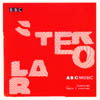 When Stereolab burst onto the music scene, critics and fans praised thefresh sound of a band who incorporated the energy and drive of groupslike Neu! combined with the artful mentalities of 1960s French popmusic. Over the years, the group's recordings have evolved from a raw,analogue sound to a much more refined, digital one. Live, however, thegroup has consistently proved their worth, evolving with theexploration of more territories and unrelentlessly dishing out thenoise, graduating to a tight, fully realized collective. This two-disccollection captures ten years of BBC radio sessions, that livein-studio moment where a band's weaknesses can easily be exposed to theworld. (Perhaps it's through these recordings they decided it was timeto get a new drummer after the first session, and perhaps they gave thebass guitarist another chance to tune up after "Check and DoubleCheck." The revolving door of keyboardists remains a mystery, however!)It's safe to say, however, that a number of these recordings that haveheld up over time, sounding remarkably as fresh as the day they werefirst broadcast. From the early low-fi days I'm reminded of the band Ifell in love with: a group who was still sort of learning their placebut were doing a fantastic job regardless. It wasn't long after therecordings that songs like "Wow and Flutter" and "French Disko" werestuck in the heads of thousands of fans and with all-out jams like"Metronomic Underground," classics of the 1990s were born. This is thelongest-spanning collection of Stereolab music issued and it providesan excellent document on their evolution as skilled players andwriters, without the advantages of studio tricks, re-takes andoverdubs, something their most recent albums might be a little toooversaturated with these days.
When Stereolab burst onto the music scene, critics and fans praised thefresh sound of a band who incorporated the energy and drive of groupslike Neu! combined with the artful mentalities of 1960s French popmusic. Over the years, the group's recordings have evolved from a raw,analogue sound to a much more refined, digital one. Live, however, thegroup has consistently proved their worth, evolving with theexploration of more territories and unrelentlessly dishing out thenoise, graduating to a tight, fully realized collective. This two-disccollection captures ten years of BBC radio sessions, that livein-studio moment where a band's weaknesses can easily be exposed to theworld. (Perhaps it's through these recordings they decided it was timeto get a new drummer after the first session, and perhaps they gave thebass guitarist another chance to tune up after "Check and DoubleCheck." The revolving door of keyboardists remains a mystery, however!)It's safe to say, however, that a number of these recordings that haveheld up over time, sounding remarkably as fresh as the day they werefirst broadcast. From the early low-fi days I'm reminded of the band Ifell in love with: a group who was still sort of learning their placebut were doing a fantastic job regardless. It wasn't long after therecordings that songs like "Wow and Flutter" and "French Disko" werestuck in the heads of thousands of fans and with all-out jams like"Metronomic Underground," classics of the 1990s were born. This is thelongest-spanning collection of Stereolab music issued and it providesan excellent document on their evolution as skilled players andwriters, without the advantages of studio tricks, re-takes andoverdubs, something their most recent albums might be a little toooversaturated with these days.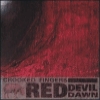 After the Archers of Loaf broke up, front man Eric Bachmann decided hestill had a significant Muse living within him, enough to warrantforming Crooked Fingers, his current project. Where the Archers of Loafhad an abrasive noisiness which was unbelievably catchy and poppy,Bachmann's Crooked Fingers has shed all of the noise and distortion fora far more plaintive and roots rock sound. Did I mention there werestrings? There are strings. Some of the songs on 'Red Devil Dawn'receive a strangely lush orchestration, complete with horns ("YouThrough a Spark") and strings ("Big Darkness," et al.). On the otherhand, the last song, "Carrion Doves," is a truly spare dirge whichreminds you how good a songsmith Bachmann is even with the moststripped-down elements. The last time I heard Crooked Fingers was whenI sought out their cover of Bruce Springsteen's "The River" (I findmyself singing this song sometimes driving late at night, in the car,alone). I was curious what Bachmann did with the Boss's ballad. Iremember it being not as good as I wanted it to be, and I was surprisedbecause Bachman's scratchy, throaty, and gruff voice was perfectlyattuned to the task. The songs on 'Red Devil Dawn' are catchy pop rocksongs, but when the strings or trumpets come in I cannot help but thinkI am listening to a Mark Knopfler album, a thought which makes me feelrather uncomfortable and causes me to look for the nearest Minor Threatalbum. While picking up my mom from the airport recently, I had theCrooked Fingers album playing in the car, and she actually asked if Iwas listening to Bruce Springsteen. Her confusion became clear to mewhen I thought about it. Someone could easily mistake this album forthe newest Tom Waits or Neil Diamond. Still, I find myself listening tothe first song, "Big Darkness," whose verses hop up and down the scalesand whose chorus is quite catchy. As long as I don't think about MarkKnopfler or Neil Diamond, I can listen to 'Red Devil Dawn' pleasantly,though I don't foresee any of its songs replacing "The River" as mylate-night solo material.
After the Archers of Loaf broke up, front man Eric Bachmann decided hestill had a significant Muse living within him, enough to warrantforming Crooked Fingers, his current project. Where the Archers of Loafhad an abrasive noisiness which was unbelievably catchy and poppy,Bachmann's Crooked Fingers has shed all of the noise and distortion fora far more plaintive and roots rock sound. Did I mention there werestrings? There are strings. Some of the songs on 'Red Devil Dawn'receive a strangely lush orchestration, complete with horns ("YouThrough a Spark") and strings ("Big Darkness," et al.). On the otherhand, the last song, "Carrion Doves," is a truly spare dirge whichreminds you how good a songsmith Bachmann is even with the moststripped-down elements. The last time I heard Crooked Fingers was whenI sought out their cover of Bruce Springsteen's "The River" (I findmyself singing this song sometimes driving late at night, in the car,alone). I was curious what Bachmann did with the Boss's ballad. Iremember it being not as good as I wanted it to be, and I was surprisedbecause Bachman's scratchy, throaty, and gruff voice was perfectlyattuned to the task. The songs on 'Red Devil Dawn' are catchy pop rocksongs, but when the strings or trumpets come in I cannot help but thinkI am listening to a Mark Knopfler album, a thought which makes me feelrather uncomfortable and causes me to look for the nearest Minor Threatalbum. While picking up my mom from the airport recently, I had theCrooked Fingers album playing in the car, and she actually asked if Iwas listening to Bruce Springsteen. Her confusion became clear to mewhen I thought about it. Someone could easily mistake this album forthe newest Tom Waits or Neil Diamond. Still, I find myself listening tothe first song, "Big Darkness," whose verses hop up and down the scalesand whose chorus is quite catchy. As long as I don't think about MarkKnopfler or Neil Diamond, I can listen to 'Red Devil Dawn' pleasantly,though I don't foresee any of its songs replacing "The River" as mylate-night solo material. 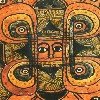 Bill Laswell is one of those "everywhere-at-once" musicians—producing,engineering and playing bass on countless albums for other artists, aswell as maintaining an absurdly prolific release schedule of his ownmusic. This album is mysteriously billed as 'Dub Chamber 4,' and sinceI haven't heard the first three Dub Chambers, I'm questoning myqualifications to write this review. However, this album does bearquite a resemblance Laswell's 'RadioAxiom: A Dub Transmission' album, acollaboration with Jah Wobble released early last year. Like thatalbum, 'Book of Exit' is a highly polished series of superlative ethnicmusic workouts, utilizing heavily percussive dub as a backbone. Thisstrategy has worked for Laswell many times before, and it works hereagain. Three of the six tracks contain beautiful, serpentine vocals byEthiopian singer GiGi, who also sang on 'RadioAxiom'. GiGi'sseductively epic vocal style works wonderfully in this context, but asLaswell's music always floats dangerously close to New Age/Worldbeatterritory, it's difficult for me to completely surrender to its beauty.There is something a little enraging about white westerners whoshamelessly co-opt the music of other cultures and blend them into asuper hi-fi pastiche that loses its meaning and context, and serves asstereo test fodder for thousands of yuppie bachelor pads. The onlythings that save Laswell's music from being relegated to this hall ofshame are his incredible grasp of composition, subtlety, and his earfor rich, captivating production. It is this amazing ear thattransforms the opening track "Ethiopia"—a combination of cleanlyplucked acoustic guitar, tabla, multitracked voice and echochamber—from an easy cliché into an alarmingly beautiful experience.Most of the album follows this same basic formula, until things get alittle bone-shaking and mind-bending towards the end, with the one-twopunch of "Shashamani" and "Land of Look Behind." The album concludeswith the long-form heroic pop of "Jerusalem," an achingly lovely paeanto an ancient holy land, rife with war and division. GiGi sings mostlyin English this time, and her sad and timely refrain of "Jerusalem,Jerusalem/You are so undone/Oh, what have you done...?" leave no doubtof this album's worthiness.
Bill Laswell is one of those "everywhere-at-once" musicians—producing,engineering and playing bass on countless albums for other artists, aswell as maintaining an absurdly prolific release schedule of his ownmusic. This album is mysteriously billed as 'Dub Chamber 4,' and sinceI haven't heard the first three Dub Chambers, I'm questoning myqualifications to write this review. However, this album does bearquite a resemblance Laswell's 'RadioAxiom: A Dub Transmission' album, acollaboration with Jah Wobble released early last year. Like thatalbum, 'Book of Exit' is a highly polished series of superlative ethnicmusic workouts, utilizing heavily percussive dub as a backbone. Thisstrategy has worked for Laswell many times before, and it works hereagain. Three of the six tracks contain beautiful, serpentine vocals byEthiopian singer GiGi, who also sang on 'RadioAxiom'. GiGi'sseductively epic vocal style works wonderfully in this context, but asLaswell's music always floats dangerously close to New Age/Worldbeatterritory, it's difficult for me to completely surrender to its beauty.There is something a little enraging about white westerners whoshamelessly co-opt the music of other cultures and blend them into asuper hi-fi pastiche that loses its meaning and context, and serves asstereo test fodder for thousands of yuppie bachelor pads. The onlythings that save Laswell's music from being relegated to this hall ofshame are his incredible grasp of composition, subtlety, and his earfor rich, captivating production. It is this amazing ear thattransforms the opening track "Ethiopia"—a combination of cleanlyplucked acoustic guitar, tabla, multitracked voice and echochamber—from an easy cliché into an alarmingly beautiful experience.Most of the album follows this same basic formula, until things get alittle bone-shaking and mind-bending towards the end, with the one-twopunch of "Shashamani" and "Land of Look Behind." The album concludeswith the long-form heroic pop of "Jerusalem," an achingly lovely paeanto an ancient holy land, rife with war and division. GiGi sings mostlyin English this time, and her sad and timely refrain of "Jerusalem,Jerusalem/You are so undone/Oh, what have you done...?" leave no doubtof this album's worthiness.samples:
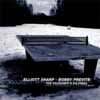 Elliott Sharp shouldn't need much of an introduction, but just in casehe does, just think of him as this bald headed big-nosedcyberpunk-obsessed improvising bassist with a mountain of recordingsand collaborations behind him. He's a mainstay of the New York KnittingFactory scene and one of those musicians whose activities have alwaysbeen on the periphery of my record collection. I've probably heardquite a lot of tracks from him here and there but before getting holdof this I only had one Carbon CD, which I found in a highly unlikelydusty old secondhand shop. This duet recording with the almost equallyprolific drummer Bobby Previte is perhaps slightly more exciting and alittle more freeform than Carbon, and mostly it's hard to believe thatit's just two people playing. They've played together a lot in the pastbut this is their first duo recording and it's obvious they couldprobably kick out deconstructed funky jams like this at the drop of ahat. Their chops are dense yet fluid, and whenever it seems they'reabout to hit a predictable groove, they pull out some new rhythmicthrust that shifts the dynamic. This can occasionally work to thealbum's detriment. For instance: at the end of one track they lock ontoa really cool Can-style hypnosis, only to curtail it prematurely.However, this is only a small niggle as it's quite a breathtakingdisplay of virtuosity that keeps up a high level of momentum and flux,as Sharp fingerhops all over the neck of his eight string guitarbass,plucks a little pedal steel and even blows a bit of bass clarinet.Unless they are overdubbing or more likely laying on delay pedaltricks, it seems he can play clarinet and bass at the same time.Although people who've heard a lot more of Sharp's recordings mighthave become jaded by now, to these ears this sounds fresh and fun.
Elliott Sharp shouldn't need much of an introduction, but just in casehe does, just think of him as this bald headed big-nosedcyberpunk-obsessed improvising bassist with a mountain of recordingsand collaborations behind him. He's a mainstay of the New York KnittingFactory scene and one of those musicians whose activities have alwaysbeen on the periphery of my record collection. I've probably heardquite a lot of tracks from him here and there but before getting holdof this I only had one Carbon CD, which I found in a highly unlikelydusty old secondhand shop. This duet recording with the almost equallyprolific drummer Bobby Previte is perhaps slightly more exciting and alittle more freeform than Carbon, and mostly it's hard to believe thatit's just two people playing. They've played together a lot in the pastbut this is their first duo recording and it's obvious they couldprobably kick out deconstructed funky jams like this at the drop of ahat. Their chops are dense yet fluid, and whenever it seems they'reabout to hit a predictable groove, they pull out some new rhythmicthrust that shifts the dynamic. This can occasionally work to thealbum's detriment. For instance: at the end of one track they lock ontoa really cool Can-style hypnosis, only to curtail it prematurely.However, this is only a small niggle as it's quite a breathtakingdisplay of virtuosity that keeps up a high level of momentum and flux,as Sharp fingerhops all over the neck of his eight string guitarbass,plucks a little pedal steel and even blows a bit of bass clarinet.Unless they are overdubbing or more likely laying on delay pedaltricks, it seems he can play clarinet and bass at the same time.Although people who've heard a lot more of Sharp's recordings mighthave become jaded by now, to these ears this sounds fresh and fun.  When you see a song title like "Trebling/Freezing," you have a prettygood idea of what kind of a listening experience you're in for. 'TheEvening Drag' is a sullen exercise that doesn't reach for much more.The album begins with "The Girls Will Haunt You," starting off strongas Kim Torrez debuts her plaintive voice amidst the band's simple, yetdeep-sounding arrangement. It's a strong hook, and yet frustratingly,the track begins to fade out unresolved, without expanding ordeveloping on its initial expression. A majority of 'The Evening Drag'mines the same territory, competent songs of quiet despair that rarelydisplay any flair or personality to set it apart from any other song onthe album. At times, it seems they tried to compensate by addingspecial effects, but more often than not, they feel out of place ordownright goofy. By the time you reach "A New Despair," an inexplicableinstrumental track that has you waiting for something, anything tohappen and then again fades out, the album's formula has begun to wearout its welcome. Torrez is capable of showing some dynamics, whichmakes the sameness of the middle of the album so disheartening. On"After the Carnival," they create an atmosphere that's positivelyblissful, as Kim croons "spin me around / spin me, make me dizzy." Theemotion is conveyed excellently, a warm memory replayed the next daythat still manages to make you smile. The final two tracks, "The Flame"and "All on Fire" also deviate from the standard sorrowful drone, thelatter beginning as a lullaby with dreamy vocals that make you glad youdidn't hit stop. 'The Evening Drag' is uneven, but with a few brightspots that make it hard to count this band out.
When you see a song title like "Trebling/Freezing," you have a prettygood idea of what kind of a listening experience you're in for. 'TheEvening Drag' is a sullen exercise that doesn't reach for much more.The album begins with "The Girls Will Haunt You," starting off strongas Kim Torrez debuts her plaintive voice amidst the band's simple, yetdeep-sounding arrangement. It's a strong hook, and yet frustratingly,the track begins to fade out unresolved, without expanding ordeveloping on its initial expression. A majority of 'The Evening Drag'mines the same territory, competent songs of quiet despair that rarelydisplay any flair or personality to set it apart from any other song onthe album. At times, it seems they tried to compensate by addingspecial effects, but more often than not, they feel out of place ordownright goofy. By the time you reach "A New Despair," an inexplicableinstrumental track that has you waiting for something, anything tohappen and then again fades out, the album's formula has begun to wearout its welcome. Torrez is capable of showing some dynamics, whichmakes the sameness of the middle of the album so disheartening. On"After the Carnival," they create an atmosphere that's positivelyblissful, as Kim croons "spin me around / spin me, make me dizzy." Theemotion is conveyed excellently, a warm memory replayed the next daythat still manages to make you smile. The final two tracks, "The Flame"and "All on Fire" also deviate from the standard sorrowful drone, thelatter beginning as a lullaby with dreamy vocals that make you glad youdidn't hit stop. 'The Evening Drag' is uneven, but with a few brightspots that make it hard to count this band out. 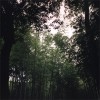 In an age where the sophomore slump is more commonplace than a bandname that starts with "The," it's a pleasure to hear an album that doesnot show any chinks in a band's armor. Sonna's lovely secondfull-length effort is not a departure for the band in any way, and whata lovely treat that is. The band continues to craft fluid instrumentalguitar music without redefining the genre, but still in a unique enoughway not to draw comparisons, and varied enough not to bog the listenerdown. The first track, "Frone Taj," opens with fervor and energy, anddoesn't let up for its duration. Chiming, dueling guitar lines startthe track off, and when the drums kick in the song just soars. Thickbut sparse bass notes underlie the proceedings, and the bright andseemingly dischordant guitar line mixed with a very pretty noteprogression on the second guitar meld better than you'd expect. Then,the band slows things down considerably for the hypnotic "Open Ended,"which features a similar melody to the end of "The Opener" on Sonna'sdebut. It just grooves along, steady faded drums and muted bass joinedby that same chime and guitar bend. Elsewhere, Sonna drones out on "OneMost Memorable," and returns to their frenetic side on "The Right Age,"but only briefly. The tempo slows mid-song, turning the song into apleasant slow dance for lovers only. The final two tracks flow intoeach other, completing a sentence together, title-wise. "Smile" is adown-tempo mix of bass, echoed guitar, and droned swells with whatsounds a lot like a harmonica joining towards the end for a beautifulclimax while "And the World Smiles With You" finishes the record offmuch like it started, with crisp drumming, intertwined guitars, andpurposeful bass. It all quiets down towards the end with harmonics andpiano for a whole "in like a lion, out like a lamb" vibe that's justmagic. Sonna's not breaking any molds, but they're certainly growinginto their own space.
In an age where the sophomore slump is more commonplace than a bandname that starts with "The," it's a pleasure to hear an album that doesnot show any chinks in a band's armor. Sonna's lovely secondfull-length effort is not a departure for the band in any way, and whata lovely treat that is. The band continues to craft fluid instrumentalguitar music without redefining the genre, but still in a unique enoughway not to draw comparisons, and varied enough not to bog the listenerdown. The first track, "Frone Taj," opens with fervor and energy, anddoesn't let up for its duration. Chiming, dueling guitar lines startthe track off, and when the drums kick in the song just soars. Thickbut sparse bass notes underlie the proceedings, and the bright andseemingly dischordant guitar line mixed with a very pretty noteprogression on the second guitar meld better than you'd expect. Then,the band slows things down considerably for the hypnotic "Open Ended,"which features a similar melody to the end of "The Opener" on Sonna'sdebut. It just grooves along, steady faded drums and muted bass joinedby that same chime and guitar bend. Elsewhere, Sonna drones out on "OneMost Memorable," and returns to their frenetic side on "The Right Age,"but only briefly. The tempo slows mid-song, turning the song into apleasant slow dance for lovers only. The final two tracks flow intoeach other, completing a sentence together, title-wise. "Smile" is adown-tempo mix of bass, echoed guitar, and droned swells with whatsounds a lot like a harmonica joining towards the end for a beautifulclimax while "And the World Smiles With You" finishes the record offmuch like it started, with crisp drumming, intertwined guitars, andpurposeful bass. It all quiets down towards the end with harmonics andpiano for a whole "in like a lion, out like a lamb" vibe that's justmagic. Sonna's not breaking any molds, but they're certainly growinginto their own space. 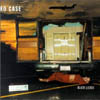 Country music is a genre marred by the Nashville Network-popularizedimages of ten-gallon hats, Shania Twain, and the "Achy Breaky Heart."Its history has been buried by line dancers and crossover hits, andthis mainstream face is often enough to make your average rock musicfan plug their ears and refuse to even entertain the thought oflistening to country music. But just as the crème de la crème of rockand electronica won't be found with a spin of the radio dial, a closerlook must be taken at artists like Neko Case who make meaningful musicthat acknowledges the rich past of country music and Americana. Nekotakes a much subtler turn on her third full-length album than on herprevious efforts. Eschewing the bright, twangy sound of 2000's superb'Furnace Room Lullaby,' 'Blacklisted' feels like a smoke-filled room,dark and foggy, but with a definite sting. The hushed, plucked acousticguitar of "Things That Scare Me" sets the late night mood of the albumwhile racing along at a gallop. Banjos, strings, and vibraphones playsupporting roles throughout the album, but the true star of'Blacklisted' is Neko's voice. She manages to lend a delicacy to herlyrics while singing with such force and emotion on tracks like"Runnin' Out of Fools" and "Deep Red Bells" that you'll fall out ofyour chair. Songs like "I Wish I Were The Moon" lament loneliness,while on "Look For Me (I'll Be Around)," Case is dangerously close toresembling a stalker. Heartache, longing, loneliness, and obsession arecommon subject matters, but the passion in her voice conveys asincerity and honesty that makes 'Blacklisted' a truly powerful album.It's the soundtrack to a sleepless night, lying in the dark, listeningto the rain where you can't stop thinking about that one person and howyou don't know where they are, or who they're with. Forget about thebaggage that country music has been tagged with. To allow preconceptionand prejudice to stand between you and this work would be a seriousmistake.
Country music is a genre marred by the Nashville Network-popularizedimages of ten-gallon hats, Shania Twain, and the "Achy Breaky Heart."Its history has been buried by line dancers and crossover hits, andthis mainstream face is often enough to make your average rock musicfan plug their ears and refuse to even entertain the thought oflistening to country music. But just as the crème de la crème of rockand electronica won't be found with a spin of the radio dial, a closerlook must be taken at artists like Neko Case who make meaningful musicthat acknowledges the rich past of country music and Americana. Nekotakes a much subtler turn on her third full-length album than on herprevious efforts. Eschewing the bright, twangy sound of 2000's superb'Furnace Room Lullaby,' 'Blacklisted' feels like a smoke-filled room,dark and foggy, but with a definite sting. The hushed, plucked acousticguitar of "Things That Scare Me" sets the late night mood of the albumwhile racing along at a gallop. Banjos, strings, and vibraphones playsupporting roles throughout the album, but the true star of'Blacklisted' is Neko's voice. She manages to lend a delicacy to herlyrics while singing with such force and emotion on tracks like"Runnin' Out of Fools" and "Deep Red Bells" that you'll fall out ofyour chair. Songs like "I Wish I Were The Moon" lament loneliness,while on "Look For Me (I'll Be Around)," Case is dangerously close toresembling a stalker. Heartache, longing, loneliness, and obsession arecommon subject matters, but the passion in her voice conveys asincerity and honesty that makes 'Blacklisted' a truly powerful album.It's the soundtrack to a sleepless night, lying in the dark, listeningto the rain where you can't stop thinking about that one person and howyou don't know where they are, or who they're with. Forget about thebaggage that country music has been tagged with. To allow preconceptionand prejudice to stand between you and this work would be a seriousmistake.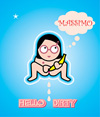 Nearly one year after his debut EP, Massimo returns with his first full-length album. For 38 minutes, this Sicilian never fails to entertain with an intense soundstream that is both twisted and distorted. Like the noisemakers of the late 1970's and early 1980's, he explores a pure lust for noise, using and abusing every possible effect to achieve amazing results. Additionally, any playback unit used becomes yet another distortion device as the LED display remains in the red zone constantly.
Nearly one year after his debut EP, Massimo returns with his first full-length album. For 38 minutes, this Sicilian never fails to entertain with an intense soundstream that is both twisted and distorted. Like the noisemakers of the late 1970's and early 1980's, he explores a pure lust for noise, using and abusing every possible effect to achieve amazing results. Additionally, any playback unit used becomes yet another distortion device as the LED display remains in the red zone constantly.
 I can safely say I haven't been this excited about a Sea and Cake albumsince 1997's 'The Fawn.' After a 2+ year hiatus, the quartet of SamPrekop, Archer Prewitt, John McEntire and Eric Claridge enter theirtenth year of releasing music together with what could easily be theyear's first masterpiece. By 2000, I honestly felt their sound wasbecoming flat, predictable and tired, both from the 'Oui' album andafter seeing a concert where every song sounded almost exactly alike.'One Bedroom' isn't a distant departure from their springy, tropicosound which resounds with a fondness of summertime, warm weather andpalm trees—but is a distinguishable evolution—incorporating only enoughmore instrumentation and variety to keep it natural sounding whilemaintaining an undeniable attractiveness that is truly intoxicating. Itopens with a perfect introduction: the fast-paced, "Four Corners" comesequipped with a three-minute instrumental lead, and from there thegroup springboards into the pleasant "Left Side Clouded," and the nerdypost-electro-funk "Hotel Tell." Punchy mid-tempo electronic jams like"Le Baron," and "Shoulder Length," can easily stop anybody whereverthey are and move uncontrollably to the rhythm while the rimshot-heavytitle track is smooth like a Piña Colada on an unpopulated sunny beach.To me, this album sounds like the time spent away has made the quartetmore fond of playing and making music together. They sound like they'rehaving fun and that this album isn't obligatory in any way. Even thealbum's closer, their tasteful cover of Bowie's "Sound and Vision" is aperfect clue that this group isn't the stuffy lot of artsy jazz fansfrom Chicago that indie record store snobs might have you believe.
I can safely say I haven't been this excited about a Sea and Cake albumsince 1997's 'The Fawn.' After a 2+ year hiatus, the quartet of SamPrekop, Archer Prewitt, John McEntire and Eric Claridge enter theirtenth year of releasing music together with what could easily be theyear's first masterpiece. By 2000, I honestly felt their sound wasbecoming flat, predictable and tired, both from the 'Oui' album andafter seeing a concert where every song sounded almost exactly alike.'One Bedroom' isn't a distant departure from their springy, tropicosound which resounds with a fondness of summertime, warm weather andpalm trees—but is a distinguishable evolution—incorporating only enoughmore instrumentation and variety to keep it natural sounding whilemaintaining an undeniable attractiveness that is truly intoxicating. Itopens with a perfect introduction: the fast-paced, "Four Corners" comesequipped with a three-minute instrumental lead, and from there thegroup springboards into the pleasant "Left Side Clouded," and the nerdypost-electro-funk "Hotel Tell." Punchy mid-tempo electronic jams like"Le Baron," and "Shoulder Length," can easily stop anybody whereverthey are and move uncontrollably to the rhythm while the rimshot-heavytitle track is smooth like a Piña Colada on an unpopulated sunny beach.To me, this album sounds like the time spent away has made the quartetmore fond of playing and making music together. They sound like they'rehaving fun and that this album isn't obligatory in any way. Even thealbum's closer, their tasteful cover of Bowie's "Sound and Vision" is aperfect clue that this group isn't the stuffy lot of artsy jazz fansfrom Chicago that indie record store snobs might have you believe. 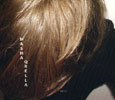 The debut solo release from Berlin-based singer/songwriter/multi-instrumentalist Masha Qrella (Contriva, Mina) is a collection of relaxed pop songwriting, based mostly around the acoustic guitar and vocals approach. Once layered with drum loops, keys, synth patches, punchy bass and the odd electric guitar, the disc's eleven tunes tend to flourish nicely while maintaining their straight-ahead direction, showcasing the compositions.
The debut solo release from Berlin-based singer/songwriter/multi-instrumentalist Masha Qrella (Contriva, Mina) is a collection of relaxed pop songwriting, based mostly around the acoustic guitar and vocals approach. Once layered with drum loops, keys, synth patches, punchy bass and the odd electric guitar, the disc's eleven tunes tend to flourish nicely while maintaining their straight-ahead direction, showcasing the compositions.
 "It's coming fast, it's a Komet!" Damned if I haven't put the wrong CDin the digipack again, I raved about that Wire EP ages ago... "It'sKoming up your arse!" Look you bastards, you aren't supposed to takethese unscientific Brain polls so seriously. I can hardly move here forWhitehouse mix tapes and it's hard to find all the CDs I didn't getround to reviewing last year. One of these was the two way electrofuckof Komet and Bovine Life. Berliner Frank Bretschneider does to hypnoticechochamber pulsebeat what opiated dubs would do to your brain if onlyyou had one. This he calls Komet and you can too if you want people toknow what you're on about when you name drop in the record shop. Hemight move in a straight line but it's a very nice and relaxing line,not lacking in momentum yet immersive. There I go thinking about Wirelike I always do. If you had a room Frank would paint it white. But hisnetmate Chris Dooks (an Edinburgh man himself) would probably splashgravity rainbows of multicoloured chaos all over it, and roll aboutlike a happy pig. That's what happens when the Komet collides with theBovine. In less esoteric and more boring but perhaps moreunderstandable terms, Komet takes a mouse and keypad to Bovine Life andclicks him up in clunky chunky robofunk. Then Bovine Life does the sameto Komet's "Flex" and they call it "Flux," as more scraped and jaggedmeltdown spasms strain to step over and throttle the accelerated beat.Then Komet steps up to roll off four deep groove tricks of precisionthrob chromkomohmsog. This is the best part of the CD and is as good asI've heard from Komet, who is firing on all cylinders here. Nextsequence is four collaborations, Komet hitting Bovine twice and viceversa. The first of these makes it difficult to finish the reviewwithout using that word 'bleep' that irritates Jon Whitney so much.Luckily Komet's angular reply is deeper (godamnit where's mythesaurus?). You could nod out to this Komet shit but a sloppy sevenstrong suite of Bovine Life's babbling brooktronix closes the disc,nudging out into further rhythmic dimensions and stutteringdistraction. Imagine the consequences for Space Invaders escaping froma Japanese keyring toy and left gasping for air in an alien atmosphere.Ok, don't then, it really doesn't matter to me. Although in somerespects they come from almost opposite ends of the beat spectrum,their collaboration works and flows well. Just in case the music isn'tenough, there are extensive notes in the booklet to help you understandwhere their heads were at when they knocked 'em together. And they'vestuck your granny's bathroom wallpaper on the cover.
"It's coming fast, it's a Komet!" Damned if I haven't put the wrong CDin the digipack again, I raved about that Wire EP ages ago... "It'sKoming up your arse!" Look you bastards, you aren't supposed to takethese unscientific Brain polls so seriously. I can hardly move here forWhitehouse mix tapes and it's hard to find all the CDs I didn't getround to reviewing last year. One of these was the two way electrofuckof Komet and Bovine Life. Berliner Frank Bretschneider does to hypnoticechochamber pulsebeat what opiated dubs would do to your brain if onlyyou had one. This he calls Komet and you can too if you want people toknow what you're on about when you name drop in the record shop. Hemight move in a straight line but it's a very nice and relaxing line,not lacking in momentum yet immersive. There I go thinking about Wirelike I always do. If you had a room Frank would paint it white. But hisnetmate Chris Dooks (an Edinburgh man himself) would probably splashgravity rainbows of multicoloured chaos all over it, and roll aboutlike a happy pig. That's what happens when the Komet collides with theBovine. In less esoteric and more boring but perhaps moreunderstandable terms, Komet takes a mouse and keypad to Bovine Life andclicks him up in clunky chunky robofunk. Then Bovine Life does the sameto Komet's "Flex" and they call it "Flux," as more scraped and jaggedmeltdown spasms strain to step over and throttle the accelerated beat.Then Komet steps up to roll off four deep groove tricks of precisionthrob chromkomohmsog. This is the best part of the CD and is as good asI've heard from Komet, who is firing on all cylinders here. Nextsequence is four collaborations, Komet hitting Bovine twice and viceversa. The first of these makes it difficult to finish the reviewwithout using that word 'bleep' that irritates Jon Whitney so much.Luckily Komet's angular reply is deeper (godamnit where's mythesaurus?). You could nod out to this Komet shit but a sloppy sevenstrong suite of Bovine Life's babbling brooktronix closes the disc,nudging out into further rhythmic dimensions and stutteringdistraction. Imagine the consequences for Space Invaders escaping froma Japanese keyring toy and left gasping for air in an alien atmosphere.Ok, don't then, it really doesn't matter to me. Although in somerespects they come from almost opposite ends of the beat spectrum,their collaboration works and flows well. Just in case the music isn'tenough, there are extensive notes in the booklet to help you understandwhere their heads were at when they knocked 'em together. And they'vestuck your granny's bathroom wallpaper on the cover.- Komet - Chrom
- Bovine Life vs. Komet - (Second Question)
- Bovine Life - 60 Minutes Strictly II
 It was probably around 1979 when I first heard the KC's "Earthbound," alive album featuring the 1971-2 incarnation of the band. That editionof KC was a good band. The rhythm section was relentless, monsterousand unforgiving, Fripp's chops had got to the point that he could holdhis own and then there was the horn blower Mel Collins Ð like ahyper-caffineated hybrid of Coltraine and Hendrix, he had the strength,creativity and stamina to step out as sax front man for this alreadyhigly dynamic band. So I'm delighted to have a new double CD of livematerial from that band's European and US tours. "Earthbound" isspecial for me in large measure because of the solos on 21st CentuarySchizoid Man. Collins' and Fripp just rip it up on that cut Ð it isunspeakably exciting. Listening to it, I often wind up doing a full-onair-sax solo in the middle of my living room. Now here's the reallygreat part: CD 2 of "Ladies of the Road" is a medly of 21stCSM solos!It opens with the song's melody but after that it's a dozen or so editsof blazing guitar and sax solos with varied sound quality, crudelyspliced together. That's a whole unrelenting hour of air-guitar andair-sax action for the energetic listener Ð quite a work-out! So,depending on your take of the 21stCSM on Earthbound, this CD will beeither a godsend or tortuous. But back to CD1, it has basically eightcuts including Pictures of a City, Formentera, Sailors Tale, Groon,Bearings and a complete 21stCSM, all of wich have good sound qualityand really good solos. Boz Burrell isn't history's greatest singer buthis contribution is somehow enchantingly dated and English (as was hissucessor John Wetton, strangely enough). Extravagant extemporisation isso much to the fore here that it almost has that jazz aspect of thetunes only being there to lead into and out of the solos. Fripp hasoften said that while KC's studio albums from 69 through 74 may beworthy in their own way, they do not at all reflect what the band waslike live. Given evidence such as this I can only agree. While thestudio albums were composed and disciplined the live bands were wildand furious, borderline out of control at times. The 4 CD set "Epitah"demonstrated the difference for the 69 band, then the "Nightwatch"double CD did so for the 73-4 band, a better document than USA, and now"Ladies of the Road" completes the task for the 71-2 band, similarlyeclipsing "Earthbound." DGM's KC Collectors' Club has released a greatdeal of live material from the 69-74 period, some of which is reallyonly for the devoted fan, but, like "Epitah" and "Nightwatch," "Ladiesof the Road" is an essential item for anyone who likes KC.
It was probably around 1979 when I first heard the KC's "Earthbound," alive album featuring the 1971-2 incarnation of the band. That editionof KC was a good band. The rhythm section was relentless, monsterousand unforgiving, Fripp's chops had got to the point that he could holdhis own and then there was the horn blower Mel Collins Ð like ahyper-caffineated hybrid of Coltraine and Hendrix, he had the strength,creativity and stamina to step out as sax front man for this alreadyhigly dynamic band. So I'm delighted to have a new double CD of livematerial from that band's European and US tours. "Earthbound" isspecial for me in large measure because of the solos on 21st CentuarySchizoid Man. Collins' and Fripp just rip it up on that cut Ð it isunspeakably exciting. Listening to it, I often wind up doing a full-onair-sax solo in the middle of my living room. Now here's the reallygreat part: CD 2 of "Ladies of the Road" is a medly of 21stCSM solos!It opens with the song's melody but after that it's a dozen or so editsof blazing guitar and sax solos with varied sound quality, crudelyspliced together. That's a whole unrelenting hour of air-guitar andair-sax action for the energetic listener Ð quite a work-out! So,depending on your take of the 21stCSM on Earthbound, this CD will beeither a godsend or tortuous. But back to CD1, it has basically eightcuts including Pictures of a City, Formentera, Sailors Tale, Groon,Bearings and a complete 21stCSM, all of wich have good sound qualityand really good solos. Boz Burrell isn't history's greatest singer buthis contribution is somehow enchantingly dated and English (as was hissucessor John Wetton, strangely enough). Extravagant extemporisation isso much to the fore here that it almost has that jazz aspect of thetunes only being there to lead into and out of the solos. Fripp hasoften said that while KC's studio albums from 69 through 74 may beworthy in their own way, they do not at all reflect what the band waslike live. Given evidence such as this I can only agree. While thestudio albums were composed and disciplined the live bands were wildand furious, borderline out of control at times. The 4 CD set "Epitah"demonstrated the difference for the 69 band, then the "Nightwatch"double CD did so for the 73-4 band, a better document than USA, and now"Ladies of the Road" completes the task for the 71-2 band, similarlyeclipsing "Earthbound." DGM's KC Collectors' Club has released a greatdeal of live material from the 69-74 period, some of which is reallyonly for the devoted fan, but, like "Epitah" and "Nightwatch," "Ladiesof the Road" is an essential item for anyone who likes KC. 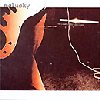 The majority of buzz surrounding this Welch rock trio has been fortheir latest release and its rough, dynamic energy cast as 'Surfer Rosa2002.' Engineered by Steve Albini, 'Do Dallas' certainly features allthe sonic hallmarks of that seminal influence, with fuzzed-out, franticguitars and a pummeling rhythm section. Rather than Black Francis'verge-of-a-mental-breakdown vocals, we're treated to a sneering AndyFalkous, who is all attitude, confidently convinced that his band isbetter than your band, and more than willing to go head to head toprove it. He delivers with conviction, occasionally dissolving intofits of yelps or slurred syllables in his effort to demonstrate hissupremacy. Mclusky is a tight, energetic group with a guitar that cutslike a serrated knife and their lyrics are almost as sharp as theirlicks, with highlights like "We take more drugs than a touring funkband" and "I'm fearful / I'm fearful / I'm fearful of flying / andflying is fearful of me!" It is a little disconcerting that some of thelyrics seem to crib from other sources, for example, the 'touring funkband' line is from the late comedian Bill Hicks, while a quote from TheSimpsons pops up near the end of the disc. Also, their swagger fails attimes, and Mclusky's bravado comes off as trite, like a confusedplayground taunt ("All your friends are cunts / your mother's aballpoint pen thief") or too cutely ironic and self-referential likethe quiet filler track "Fuck This Band." Straight ahead, surging rocktracks like "Dethink to Survive" show that they can make the familiarsound exciting, while "Clique Application Form," a noisy, shamblingtrack with shouts of "Never been kissed! Never been kissed!" mayforeshadow future attempts to broach new territory. Despite thederivative aspects, 'Mclusky Do Dallas' manages to be exhilarating andentertaining in its brief thirty-five minutes. When Falkous commandsyou to "sing it!" on the standout "To Hell With Good Intentions," youfeel compelled to do something, maybe yell or bark or pump your fist.His band may not be better than your band (In fact, they might haveripped your band off a little), but 'Do Dallas' is a fun, albeitbrainless record. Just don't expect it to stay in your CD player fortoo long.
The majority of buzz surrounding this Welch rock trio has been fortheir latest release and its rough, dynamic energy cast as 'Surfer Rosa2002.' Engineered by Steve Albini, 'Do Dallas' certainly features allthe sonic hallmarks of that seminal influence, with fuzzed-out, franticguitars and a pummeling rhythm section. Rather than Black Francis'verge-of-a-mental-breakdown vocals, we're treated to a sneering AndyFalkous, who is all attitude, confidently convinced that his band isbetter than your band, and more than willing to go head to head toprove it. He delivers with conviction, occasionally dissolving intofits of yelps or slurred syllables in his effort to demonstrate hissupremacy. Mclusky is a tight, energetic group with a guitar that cutslike a serrated knife and their lyrics are almost as sharp as theirlicks, with highlights like "We take more drugs than a touring funkband" and "I'm fearful / I'm fearful / I'm fearful of flying / andflying is fearful of me!" It is a little disconcerting that some of thelyrics seem to crib from other sources, for example, the 'touring funkband' line is from the late comedian Bill Hicks, while a quote from TheSimpsons pops up near the end of the disc. Also, their swagger fails attimes, and Mclusky's bravado comes off as trite, like a confusedplayground taunt ("All your friends are cunts / your mother's aballpoint pen thief") or too cutely ironic and self-referential likethe quiet filler track "Fuck This Band." Straight ahead, surging rocktracks like "Dethink to Survive" show that they can make the familiarsound exciting, while "Clique Application Form," a noisy, shamblingtrack with shouts of "Never been kissed! Never been kissed!" mayforeshadow future attempts to broach new territory. Despite thederivative aspects, 'Mclusky Do Dallas' manages to be exhilarating andentertaining in its brief thirty-five minutes. When Falkous commandsyou to "sing it!" on the standout "To Hell With Good Intentions," youfeel compelled to do something, maybe yell or bark or pump your fist.His band may not be better than your band (In fact, they might haveripped your band off a little), but 'Do Dallas' is a fun, albeitbrainless record. Just don't expect it to stay in your CD player fortoo long. 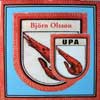 This is the second solo release from the guitarist of Union CarbideProductions, Soundtrack of Our Lives and Spain, among others, following1999's apparently well-recieved 'Instrumentalmusik'. There are severalunusual aspects to UPA, all of which are worthwhile. First, upliftingcelebratory music like this is smile and happiness-inducing. LikeShooby Taylor or High Rise, it just works in that way.Next, it is mostly based on unlikely combinations of musical styles: aNotting Hill Festival-style steel band music with heavy progressiverock, Herb Alpert horns with blissed-out space-wah guitar, 80s MORpower ballad with Moricone western and 60s spy movie themes,traditional Scotish dance music with French girl-group harmy vocals,Sweedish folk and kraut rock. The success Olsson has with thesecombinations suggests a rare compositional talent as the tunes gel andjust work as though these styles always belonged together. Quite unlikeZorn's genre-hopping in the 80s, UPA works more as though a master likeQuincy Jones were doing genre set pieces. It's a dazzling, intoxicatingtour that would be surreal if it weren't so natural in appearance.Then, for nerds like me there's some excellent guitar work on severalcuts to be enjoyed, including a storming psychedelic work-out to closethe album. But there's more, the disk has utilitarian strengths too:1.) the post-modern aspect (not that there's anything tounge-in-cheekabout UPA) means that you can enjoy these highly unfashionable anduncool musical styles (that deep down you love and would listen to moreoften if you weren't so self-concious) without fear of losingcredibility among your most sophisticated friends, and 2.) it's so welldone, nice and easy going that straight and square friends are going todig it too.To top it all off, the whole album appears twice on the same CD! The first time around, it is with a polished studio sound while thesecond version is low-fi, apparently having been run through a cassetteplayer with what sounds like a fairly cheesy AGC. With an album likethis which deserves repeated plays, why not have it these two different ways?-
This is the second solo release from the guitarist of Union CarbideProductions, Soundtrack of Our Lives and Spain, among others, following1999's apparently well-recieved 'Instrumentalmusik'. There are severalunusual aspects to UPA, all of which are worthwhile. First, upliftingcelebratory music like this is smile and happiness-inducing. LikeShooby Taylor or High Rise, it just works in that way.Next, it is mostly based on unlikely combinations of musical styles: aNotting Hill Festival-style steel band music with heavy progressiverock, Herb Alpert horns with blissed-out space-wah guitar, 80s MORpower ballad with Moricone western and 60s spy movie themes,traditional Scotish dance music with French girl-group harmy vocals,Sweedish folk and kraut rock. The success Olsson has with thesecombinations suggests a rare compositional talent as the tunes gel andjust work as though these styles always belonged together. Quite unlikeZorn's genre-hopping in the 80s, UPA works more as though a master likeQuincy Jones were doing genre set pieces. It's a dazzling, intoxicatingtour that would be surreal if it weren't so natural in appearance.Then, for nerds like me there's some excellent guitar work on severalcuts to be enjoyed, including a storming psychedelic work-out to closethe album. But there's more, the disk has utilitarian strengths too:1.) the post-modern aspect (not that there's anything tounge-in-cheekabout UPA) means that you can enjoy these highly unfashionable anduncool musical styles (that deep down you love and would listen to moreoften if you weren't so self-concious) without fear of losingcredibility among your most sophisticated friends, and 2.) it's so welldone, nice and easy going that straight and square friends are going todig it too.To top it all off, the whole album appears twice on the same CD! The first time around, it is with a polished studio sound while thesecond version is low-fi, apparently having been run through a cassetteplayer with what sounds like a fairly cheesy AGC. With an album likethis which deserves repeated plays, why not have it these two different ways?-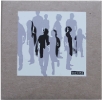 It might happen that the worthiness of an album becomes gauged onwhether it is able to marry the cacophony of firecrackers with thefrailest of human voices. When this happens (and surely it willhappen), then 'Dark Falcon' will be the first and perhaps only recordwhich will measure up to this standard of excellence. 'Dark Falcon,'the first full length from Lucky Dragons (after two lovely EP's on theEnglish Muffin label), does many other things remarkably well, but thispeculiar marriage is the most remarkable. Although there are clicks andclacks aplenty on this album, the electronics grace the songs ratherthan linger at the center of them.
It might happen that the worthiness of an album becomes gauged onwhether it is able to marry the cacophony of firecrackers with thefrailest of human voices. When this happens (and surely it willhappen), then 'Dark Falcon' will be the first and perhaps only recordwhich will measure up to this standard of excellence. 'Dark Falcon,'the first full length from Lucky Dragons (after two lovely EP's on theEnglish Muffin label), does many other things remarkably well, but thispeculiar marriage is the most remarkable. Although there are clicks andclacks aplenty on this album, the electronics grace the songs ratherthan linger at the center of them.The more frantic songs bookend the album while a bank of more reservedsongs populates the middle of it, where beats plod along with theexhalations of an accordion, or the pluckings of a banjo, or just thewhimsical humming of band members. Besides the frantic ends and themore placid middle, there are further dichotomies both between andwithin songs on 'Dark Falcon.' These contrasts are often exhilarating,and sometimes even exhausting (in the best possible way). "Cherchez leDragon" starts out stuttering wildly, trying to evince some statementbut only ejecting playful electronic spittle. It is not until theplacating guitar part comes in that the song is able to demonstrateclearly what it is trying to say. The guitar and the voice parts soothethe hyperactive beat better than a bottle of Ritalin; once they calmthe beat, the stutter decreases and the song is persuaded intoobedience. The opener, "Heartbreaker," features a field recording ofkids setting off Independence Day firecrackers with cars driving by insome neighborhood in Providence and the sound culled from thisrecording is undeniably urban. Later in the song, a gentle female voicecomes in and it sounds like it is being sung from the most remote logcabin in the backwoods of Montana, or maybe it was Kentucky. I canpicture the cabin, with one window illuminated by a gaslight in thedark, and the sound of a girl singing as it rises, just barelyperceptible, above the wind moving through trees. Somehow, thisunmistakably rural piece, which is clearly not part of the firecrackerrecording, is able to synchronize with the more urban sample, andtogether they create a perfected hybrid lullaby.
 It's very seldom that fans of instrumental rock and electronic wizardryget to hear artists from both genres collaborate, maybe because theresults are often disastrous (anyone hear the Scanner remixes ofHovercraft?). Therefore, it's a rare treat when such a collaborationfares as well as this one. Sonna need no introduction, as their variousCD singles provided that before their critically lauded debut in 2001(stay tuned for it's successor next week). Sybarite, either, whoseoutput has seemed to dim in quality a bit on 4AD, but there's extremehope for the future. Lilienthal may be new to some out there, with onlya few remixes and one CD under his name, but he's already building areputation for amalgamation and an impressive palette. The originalcollaboration, first released as a seven inch on ZEAL, makes up theintroductory two tracks here, where Sonna sent some unfinishednoodlings to both artists for recreation. The results are varied andhair-raising. Sybarite accentuates the melodic side of Sonna on "MakeShift," with beautiful acoustic guitar-picking taking center stage. Asthe steady beat builds and the infectious whistles and backwards soundsswell, you can't take your ears off of it. This is easily the bestthing Sybarite's done lately. Sonna's drone side takes over Lilienthal,as he stutters up "Carousel" towards a complicated and layered climax.He drops out the middle, teasing and taunting with more guitarinterplay, only to return to the same shaky ground on the closing threeminutes, all of which induce toe-tapping and air-drumming in even thetamest lab rats. This is well enough alone, but then we are treated totwo new tracks, credited to all three bands. Here is where the jawsdrop. "Four Way Street" is a slightly remixed reprise of the closingminutes of "The Opener" from Sonna's debut full-length. At just under aminute, it can't really captivate. The final track, "From a Person WeSeam" is astonishing - a real electronic masterwork. The song startsslowly and calmly, with gentle guitar and squelch effects, beforeexercising a labored trip-hop beat and keyboard flourishes with greatsuccess. An open letter to all three particpants: please make a wholerecord in this configuration. The world demands it.
It's very seldom that fans of instrumental rock and electronic wizardryget to hear artists from both genres collaborate, maybe because theresults are often disastrous (anyone hear the Scanner remixes ofHovercraft?). Therefore, it's a rare treat when such a collaborationfares as well as this one. Sonna need no introduction, as their variousCD singles provided that before their critically lauded debut in 2001(stay tuned for it's successor next week). Sybarite, either, whoseoutput has seemed to dim in quality a bit on 4AD, but there's extremehope for the future. Lilienthal may be new to some out there, with onlya few remixes and one CD under his name, but he's already building areputation for amalgamation and an impressive palette. The originalcollaboration, first released as a seven inch on ZEAL, makes up theintroductory two tracks here, where Sonna sent some unfinishednoodlings to both artists for recreation. The results are varied andhair-raising. Sybarite accentuates the melodic side of Sonna on "MakeShift," with beautiful acoustic guitar-picking taking center stage. Asthe steady beat builds and the infectious whistles and backwards soundsswell, you can't take your ears off of it. This is easily the bestthing Sybarite's done lately. Sonna's drone side takes over Lilienthal,as he stutters up "Carousel" towards a complicated and layered climax.He drops out the middle, teasing and taunting with more guitarinterplay, only to return to the same shaky ground on the closing threeminutes, all of which induce toe-tapping and air-drumming in even thetamest lab rats. This is well enough alone, but then we are treated totwo new tracks, credited to all three bands. Here is where the jawsdrop. "Four Way Street" is a slightly remixed reprise of the closingminutes of "The Opener" from Sonna's debut full-length. At just under aminute, it can't really captivate. The final track, "From a Person WeSeam" is astonishing - a real electronic masterwork. The song startsslowly and calmly, with gentle guitar and squelch effects, beforeexercising a labored trip-hop beat and keyboard flourishes with greatsuccess. An open letter to all three particpants: please make a wholerecord in this configuration. The world demands it. I bought this album after being captivated by the band name and albumtitle, having no prior knowledge about them. Both had a sonorousquality which made me intensely curious to hear what such a band wouldsound like. To my delight, in doing so, I discovered what was to becomeone of my favorite albums of 2002. Sam Beam, who is almost solelyresponsible for the writing, performance, production and recording of'The Creek Drank the Cradle', creates pleasantly unpolished songs usinglittle more than an acoustic guitar, banjo and his own delicate vocalsthat belie their no-frills approach with a rich, seductive sound. Beamclearly takes influence from Nick Drake and Tim Buckley, but trulycarves his own niche in terms of his folk stylings. This album,however, definitely is not a "folk record," but reaches far beyond,ranging from lullabies to ballads to narrative fragments of memories.The American Deep South features prominently in the lyrical imagery,accented by an eerie romanticism. Beam, who hails from the Miami area,seems to be yearning for a South removed from beaches and nightclubs,on tracks like the twangy "The Rooster Moans" and the haunting "Upwardover the Mountain." There is a purity in the simplicity of Iron &Wine that is so refreshing that 'The Creek Drank the Cradle'unsurprisingly appeals to true music lovers of diverse tastes. As SamBeam's moniker suggests, his music is both weighty and intoxicating.
I bought this album after being captivated by the band name and albumtitle, having no prior knowledge about them. Both had a sonorousquality which made me intensely curious to hear what such a band wouldsound like. To my delight, in doing so, I discovered what was to becomeone of my favorite albums of 2002. Sam Beam, who is almost solelyresponsible for the writing, performance, production and recording of'The Creek Drank the Cradle', creates pleasantly unpolished songs usinglittle more than an acoustic guitar, banjo and his own delicate vocalsthat belie their no-frills approach with a rich, seductive sound. Beamclearly takes influence from Nick Drake and Tim Buckley, but trulycarves his own niche in terms of his folk stylings. This album,however, definitely is not a "folk record," but reaches far beyond,ranging from lullabies to ballads to narrative fragments of memories.The American Deep South features prominently in the lyrical imagery,accented by an eerie romanticism. Beam, who hails from the Miami area,seems to be yearning for a South removed from beaches and nightclubs,on tracks like the twangy "The Rooster Moans" and the haunting "Upwardover the Mountain." There is a purity in the simplicity of Iron &Wine that is so refreshing that 'The Creek Drank the Cradle'unsurprisingly appeals to true music lovers of diverse tastes. As SamBeam's moniker suggests, his music is both weighty and intoxicating.samples:



